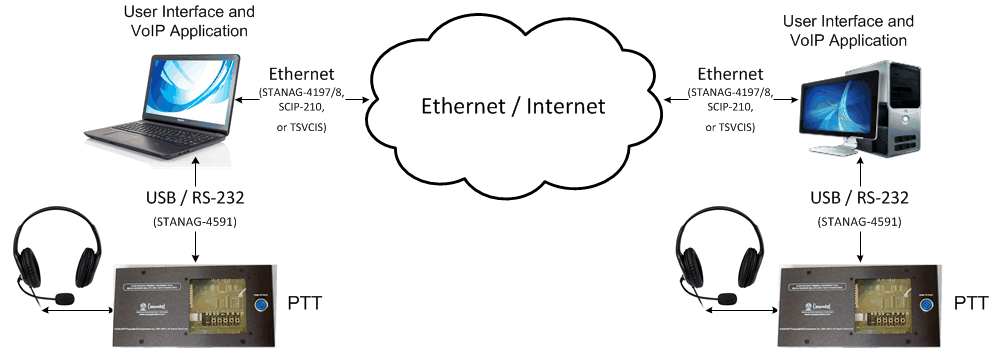MELPe using Secure Communication Interoperability Protocol (SCIP)
The Secure Communication Interoperability Protocol (SCIP) is an application layer signalling protocol used to transmit secure voice using STANAG-4591 MELPe codec, and G729D codec over digital cellular systems such as GSM and CDMA, digital mobile satellite systems.
The SCIP is a multinational communications standard for application layer protocol developed by the National Security Agency (NSA) to enable interoperable secure communications among allies and partners around the globe. [6] The SCIP-210 Signaling Plan is the specification that defines the application layer signaling used to negotiate a secure end-to-end session between two communication devices, independent of network transport. The SCIP supported channels include digital cellular systems such as GSM and CDMA, digital mobile satellite systems, and a variety of other narrowband digital systems. Its Secure and Clear MELPe Voice applications use MELPe codec, G729D, Voice Activity Detection based Discontinuous Voice (DTX Voice), and Comfort Noise, both are implemented similarly to the GSM standard. Compandent's MELPe software under Android was used and tested by NATO also as part of the development of SCIP-210.
Compandent's STANAG-4591 MELPe suits can be used along with SCIP software. Alternatively Compandent's FLEXI-232 DTE may be used along with some additional processing to form a SCIP based vocoder, as illustrated below.

Similarly, when modem is used, Compandent's FLEXI-232 DTE may be used along with some additional processing to form a SCIP based vocoder, as illustrated below.

References
- "A Mixed Excitation LPC Vocoder Model for Low Bit Rate Speech Coding," Alan V. McCree, Thomas P. Barnweell, 1995 in IEEE Trans. Speech and Audio Processing (Original MELP).
- "Analog-to-Digital Conversion of Voice by 2,400 Bit/Second Mixed Excitation Linear Prediction (MELP)," US DoD (MIL_STD-3005, Original MELP).
- "The 1200 and 2400 bit/s NATO Interoperable Narrow Band Voice Coder," STANAG-4591, NATO.
- "MELPe Variation for 600 bit/s NATO Narrow Band Voice Coder, STANAG-4591," NATO.
- Alan McCree, “A scalable phonetic vocoder framework using joint predictive vector quantization of MELP parameters,” in Proc. IEEE Int. Conf. Acoust., Speech, Signal Processing, 2006, pp. I 705–708, Toulouse, France.
- "SCIP Signaling Plan," Revision 3.6 January 8, 2013.
- “Tactical Secure Voice Cryptographic Interoperability Specification (TSVCIS) Version 2.1,” July 2, 2012.
FIND OUT MORE ABOUT MELPE SOFTWARE
To find out more about Compandent's STANAG-4591 MELPe software...